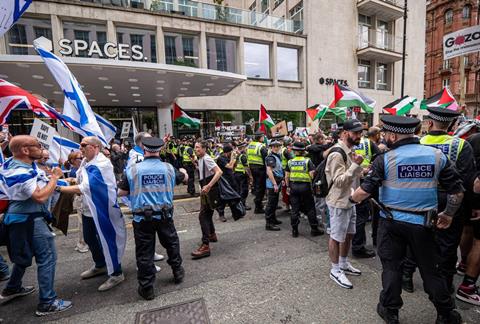When everyone is an extremist, George Pitcher argues it’s time for Christians to reclaim the middle ground

I’m an extremist. Or at least I seem to be to all the other extremists I know, which sometimes seems to be pretty much everybody.
If I’m (very) critical of the state of Israel’s attempted erasure of Gaza, I’m called an antisemite. If I say that Hamas has to be erased from political governance in the Middle East, I’m called an islamophobe. For the record, I hold both positions.
When everyone’s an extremist
Should I support Britain’s sovereignty (which is kind of a no-brainer), I’m a Brexiteer. If I hold that the UK should be closely integrated with the rest of Europe (as I do), I’m a Remoaner. Both views are entirely compatible.
When I support trans rights, I’m a lefty wokist. When I defend single-sex spaces, or indeed the right of someone to define womanhood, I’m a terf or gender-critical or a transphobe, all of which are extremist positions.
Should I question net zero targets, the efficacy of wind farms or the economic viability of electric transport, I’m a climate denier. But when I applaud green efforts to improve our environment and halt the poisoning of the planet by rapacious industries, I’m an irresponsible wrecker and “warmist”.
If I oppose assisted dying (as I do), I’m a religious fanatic who wants to see people suffer. If I venture that small-boat immigrants should be treated compassionately, I’m happy to see indigenous populations “overrun”, or even a proponent of great replacement theory. For Conservatives, I’m a Marxist and for socialists I’m a privileged, white capitalist.
As I’ve indicated on the way through this list, I support some, if not many, of these views simultaneously. At best, this makes me a namby-pamby, wishy-washy centrist who can’t commit.
At worst, I get shot in the crossfire from both sides. Again, at best, I compromise; at worst, I’m part of a political elite who manage things to stay the same in our own best interests.
A voice in the wilderness of the middle cries out bravely and strongly and what it invariably has to shout is “stop it!”
It’s no original observation to say that extremism is all the rage. The extreme right is back in politics across the US and Europe. The opposition to it has to be extreme left in order to maintain some semblance of balance, or at least so the argument goes.
The usual culprits for this polarisation exist in plain sight. Donald Trump is living evidence that my enemy’s enemy is my friend and any variation of that equation can be shuffled to suit his circumstance. And not just on the big issues. Trump loves jeans model Sydney Sweeney (Republican) and “HATE[S]” (his caps) popstar Taylor Swift (Democrat).
All enabled in the age of social media. It’s not just that if I write on any of the subjects above I will invite a tidal pile-on. It’s that one has to be ever more extreme online to attract attention. Look at (actually don’t) Bonnie Blue, aka Tia Billinger, whose stunt of having, ahem, publicly paid-for congress with over 1,000 men in twelve hours makes Mary Whitehouse’s campaign against Page 3 girls, let alone the late shock-jock James Whale’s world record of kissing 4,000 women in eight hours, seem rather sweet and tame.
Extremism is both an economic and political marketplace. It’s in this context that being in the middle ground begins to get more dangerous. But I’d like to make a case for it being where the religious voice is heard. And it can’t be heard unless we speak up.
Not compromise
Let me start with an unreligious voice. Clive Stafford Smith is a civil rights lawyer who has dedicated his legal life to the defence of prisoners on death row in the US and elsewhere and to the appeals of those held for alleged terrorism in Guantanamo Bay. He describes his job sometimes as “standing between the haters and the hated”.
That sounds like a pretty good vocation to me. As you can imagine, it’s not a safe place to be. This is not the position of someone who can’t make their mind up. To be in the middle is not to be the dreary voice of moderation – you can’t execute a prisoner just a bit, after all, any more than you can moderate the killing in Gaza or introduce a little bit of euthanasia into society. A voice in the wilderness of the middle cries out bravely and strongly and what it invariably has to shout is “stop it!”
From the perspective of faith, it means squaring up to both sides and that’s not a compromise. It used to be the Christian voice in the Middle East, before a toxic mixture of intolerance, persecution and replacement largely silenced it. Its absence shows how much it is needed.
It’s the voice that stood between Roman oppressors and the Jewish and gentile oppressed in first century Judea. Leaders need to find it again. It’s neither weak nor extremist. But it is radical.






































No comments yet